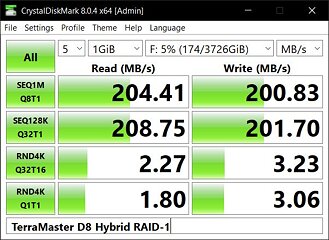 21
21
TerraMaster D8 Hybrid Review
Performance: Sequential File Copying »CrystalDiskMark
The first benchmark we ran on the D8 Hybrid was CrystalDiskMark, as it's a quick and easy test to run and gives us a baseline for the drive performance. We tested four different configurations, single hard drive, RAID 1, RAID 0 and with an SSD. The RAID 1 numbers were a little bit slower than the single drive numbers, most likely due to the MCU in the ASM1352R having to duplicate the data on the second drive in the RAID array and not quite having enough performance to do so at full speed.
The RAID 0 numbers more or less doubled the sequential read and write performance compared to the single drive tests, but the benefit of RAID 0 in the random tests was either absent or offered little extra performance, especially on the read side. Plopping in an SSD in the D8 Hybrid shows that the DAS is capable of hitting 10 Gbps speeds, minus overheads and the write performance is similar to other 10 Gbps USB 3.2 Gen 2 connected storage devices. However, the write performance is lacking somewhat, and we tested with different drives to see if it was the drive in question that ended up thermal throttling, but the rest were similar enough that this was unlikely to be the case. As such, this appears to be either a hardware or a firmware limitation of the D8 Hybrid.
Helios LanTest
Single drive
RAID 1
RAID 0
SSD
Although the Helios LanTest is intended for testing NAS appliances, it can also be used for testing local drives and as the TerraMaster D8 Hybrid can be used to expand a NAS, we figured we'd use it here to see what kind of performance we can expect. Again we're seeing a slight dip in performance going from a single drive to RAID 1, suggesting that there is some kind of processing overhead here. It's still a small price to pay for an automatic duplicate of your data when you're doing a backup. The RAID 0 benchmarks aren't showing as big of a performance increase as CrystalDiskMark, but we're still close to doubling the throughput. Moving to the SSD tests we're again seeing great write performance, but the read performance is falling behind even further here when compared to CrystalDiskMark.
Jul 12th, 2025 09:27 CDT
change timezone
Latest GPU Drivers
New Forum Posts
- No offense, here are some things that bother me about your understanding of fans. (36)
- Stupid buggy POS Realtek WiFi RTL8852BE (11)
- Swapping existing router w/ a replacement; any issues? (14)
- 'NVIDIA App' not usable offline? (13)
- Chrome has removed uBlock Origin 1.64.0 (remove google search suggestions) (12)
- Share your AIDA 64 cache and memory benchmark here (3097)
- The Official Linux/Unix Desktop Screenshots Megathread (778)
- [GPU-Z Test Build] New Kernel Driver, Everyone: Please Test (90)
- Gigabyte graphic cards - TIM gel SLIPPAGE problem (150)
- NVIDIA App (55)
Popular Reviews
- Fractal Design Epoch RGB TG Review
- Lexar NM1090 Pro 4 TB Review
- Corsair FRAME 5000D RS Review
- NVIDIA GeForce RTX 5050 8 GB Review
- NZXT N9 X870E Review
- Our Visit to the Hunter Super Computer
- Sapphire Radeon RX 9060 XT Pulse OC 16 GB Review - An Excellent Choice
- AMD Ryzen 7 9800X3D Review - The Best Gaming Processor
- Upcoming Hardware Launches 2025 (Updated May 2025)
- Chieftec Iceberg 360 Review
TPU on YouTube
Controversial News Posts
- Intel's Core Ultra 7 265K and 265KF CPUs Dip Below $250 (288)
- Some Intel Nova Lake CPUs Rumored to Challenge AMD's 3D V-Cache in Desktop Gaming (140)
- AMD Radeon RX 9070 XT Gains 9% Performance at 1440p with Latest Driver, Beats RTX 5070 Ti (131)
- NVIDIA Launches GeForce RTX 5050 for Desktops and Laptops, Starts at $249 (119)
- NVIDIA GeForce RTX 5080 SUPER Could Feature 24 GB Memory, Increased Power Limits (115)
- Microsoft Partners with AMD for Next-gen Xbox Hardware (105)
- Intel "Nova Lake‑S" Series: Seven SKUs, Up to 52 Cores and 150 W TDP (100)
- NVIDIA DLSS Transformer Cuts VRAM Usage by 20% (97)







